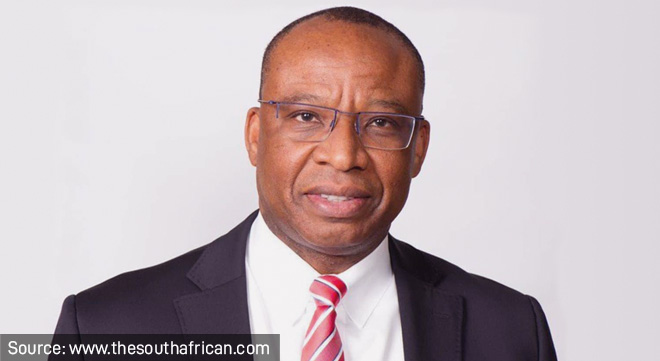South Africa needs a far greater sense of urgency in tackling low economic growth and unemployment, or it risks become a failed state, says Daniel Mminele, the incoming chairperson of Nedbank.
Mminele, who resigned as chairperson of Alexforbes to take up his role at Nedbank, was previously the chief executive of Absa and after he resigned from the South African Reserve Bank (Sarb), where was a deputy governor for two consecutive five-year terms. He was also the head of President Cyril Ramaphosa’s Climate Finance Task Team.
The economy, which seemed to be trapped in a low-growth trajectory, was “in a deep crisis”. The problems at Eskom and Transnet, and crime and corruption were taking a heavy toll on economic growth, Mminele told PSG’s recent Think Big webinar.
The National Development Plan suggested that South Africa should be targeting a sustainable annual growth rate of about 5%, underpinned by a gross fixed capital formation ratio of about 25, to reduce unemployment. But the country was far from achieving this. The GDP growth rate for 2022 was only 2%, which included a contraction of 1.3% in the final quarter of the year. And that 2% growth was only 0.3% higher than pre-Covid levels, he said.
The outlook for 2023 is similarly bleak, with the most recent forecasts suggesting the country may struggle to register any growth. The Sarb has forecast growth of 0.2%, and the forecast from the International Monetary Fund was even worse, at 0.1%. These forecasts should be seen in the context of population growth of about 1.6%, which meant that, on a per capita basis, the country was “actually going backwards”, Mminele said.
Reviving economic growth will require a collaborative approach between the public and private sectors, as well as strong and decisive leadership.
“Quite frankly, we need a higher sense of urgency in tackling these issues, and much stronger implementation frameworks and stronger accountability frameworks, otherwise we are indeed, as many have said, running a risk of becoming a failed state, because we’re already on borrowed time.”
He did not think it was too late “to fix what we need to fix”. However, the country needed to redouble its efforts to do whatever it will take to get the economy growing again.
Grey-listing could have been avoided
South Africa’s grey-listing has raised concerns about the state of the country’s financial institutions, its policies on financial crimes, and the health of its investment environment. But South Africa’s grey-listing was not an “indictment on the banking sector” but a symptom of other parts of the system that have not adequately addressed and mitigated the risks surrounding financial crime, Mminele said.
The banking sector made good progress in addressing the deficiencies identified by the Financial Action Task Force (FATF). It was the remedial actions relating to legislation and the criminal justice system that were responsible South Africa’s grey-listing, he said.
Grey-listing was “somewhat self-inflicted” because the country was given “ample warning” about exactly what had to be fixed. Although the FATF acknowledged that the government did eventually pass the required legislation, it did not act with speed and urgency, Mminele said.
Although some of the implications of grey-listing have been priced in, the country could not afford to be complacent. If South Africa was perceived to be taking too long to implement the FATF’s action plan, foreign sentiment towards the country could become markedly worse, resulting in higher funding costs and more expensive correspondent banking relationships, he said.
“It’s things that we haven’t seen now. But we can’t be complacent,” he said.
Nationalising the Sarb won’t change its mandate
The webinar also raised the issue of whether the nationalisation of the Sarb would be in the best interests of the country.
Mminele said it was not surprising, amid the policy decisions taken by central banks to combat elevated inflation, that the role of the Sarb would come back into focus.
He said the independence of the Sarb tends to be part of a discussion that focuses on three issues that are sometimes confused: the mandate of the Sarb and how that mandate is executed, which speaks to its independence, and the ownership structure of the Sarb.
The major subject of discussion has been the appropriateness of the scope of the Sarb’s mandate and its ownership structure, not its independence, Mminele said. Both the government and the ANC have reaffirmed the need to protect the independence of the Sarb as it is enshrined in the Constitution.
There was “a historic anomaly” around the shareholding structure of the Sarb, in that it still has private shareholders. However, contrary to what many believe, Mminele said this shareholding structure does not result in these shareholders having any influence or control over the key responsibilities of the bank as they relate to monetary policy, financial stability, prudential supervision, oversight of the payments system, or the monopoly right of issue when it comes notes and coins.
It was therefore wrong to think that nationalising the Sarb may lead to a change in its mandate or independence, because changing both would require a constitutional amendment, Mminele said.
As far as the Sarb’s mandate is concerned, the Constitution states clearly that the primary object of the Sarb is to protect the value of the currency in the interests of balanced and sustainable growth.
The Sarb cannot target growth and employment directly, but it can contribute to creating an environment that is conducive to growth.
Independence does not mean the Sarb has “free reign”. It merely affords the institution the privilege to act with professional objectivity, free from political influence.
There was therefore no credence to the view that the Sarb was a “state within a state”. Instead, Mminele said, “the best way to look at this issue is to understand that the Sarb is independent within the broader system of economic governance but not independent of it”.



